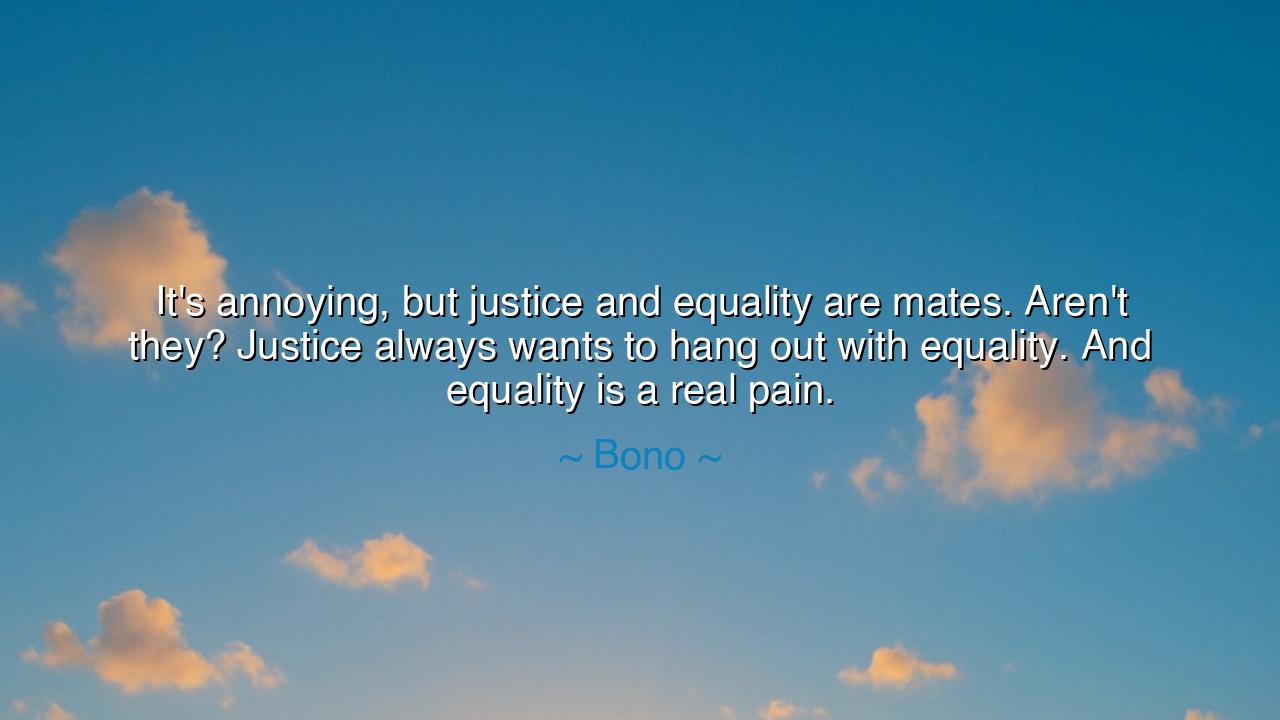
It's annoying, but justice and equality are mates. Aren't they?
It's annoying, but justice and equality are mates. Aren't they? Justice always wants to hang out with equality. And equality is a real pain.






The words of Bono, “It’s annoying, but justice and equality are mates. Aren’t they? Justice always wants to hang out with equality. And equality is a real pain,” are both playful and profound — the voice of a poet who sees truth through irony. With humor and honesty, he captures an ancient struggle: that justice and equality, though born of the same spirit, are uneasy companions in the affairs of humankind. His tone may seem casual, but beneath it lies a wisdom older than empires — the recognition that fairness is not a feeling, and equality is not a comfort. They demand effort, humility, and the courage to face one’s own privilege.
To understand his words, we must first hear the laughter behind them — the weary laughter of one who has wrestled long with the world’s contradictions. Bono, the artist and activist, has spent decades advocating for the poor, the oppressed, and the voiceless — from Africa’s struggle with poverty and disease to campaigns for debt relief and human rights. He has seen how justice, which calls for righteousness, often leads one into the thorny wilderness of equality, which demands sacrifice. To pursue justice without equality is to seek balance while refusing to share the weight. Yet equality itself can be “a real pain,” as he says, because it forces the comfortable to change, and the powerful to yield.
The ancients, too, knew this dilemma well. In the Republic, Plato spoke of justice as harmony — each part of the soul, and each part of society, fulfilling its proper role. But he also warned that harmony requires fairness among unequals, and fairness requires restraint from those who hold more power. Equality, then, becomes the burden of the strong: to limit themselves for the good of all. This is why Bono calls it “annoying” — for while justice sounds noble in theory, equality demands the daily, difficult work of making it real. It is the friend who tells us uncomfortable truths, who insists that we look at the world as it truly is, not as we wish it to be.
Consider the story of Nelson Mandela, whose life mirrors the marriage of these two ideals. He sought justice for South Africa — to end the cruel rule of apartheid — but he understood that true justice could not exist without equality between black and white, rich and poor, ruler and ruled. Yet equality came at a terrible price: forgiveness. After 27 years in prison, Mandela chose not revenge but reconciliation, knowing that justice without mercy would only breed more hatred. He embraced equality as the painful companion of justice — the “real pain” that Bono describes — for equality demanded that he love those who had once despised him.
And so it is in every age: justice calls for righting wrongs, but equality asks that we change ourselves. To give food to the hungry is justice; to sit and eat beside them as equals is equality. The first soothes the conscience; the second transforms the heart. Bono’s words remind us that the fight for a just world will always test our patience, for equality disturbs comfort and dismantles hierarchy. It is easy to cry for justice when others are oppressed; it is harder to accept equality when it requires that we lose our place of advantage.
Yet, as Bono says, justice and equality are mates — they cannot be separated. Without equality, justice becomes charity, given from above rather than shared among equals. Without justice, equality becomes chaos, where fairness dissolves into envy. Together, they form the balance of civilization — the two wings by which humanity may rise. The wise accept their companionship, no matter how “annoying” it may be, for only through their union can peace and dignity endure.
Let this, then, be the lesson for all generations: do not seek justice without the humility of equality. When you cry for fairness, look inward and ask what you are willing to surrender. When you fight for the weak, remember that equality means listening, not only leading. It will test your patience, bruise your pride, and challenge your ease — but it will also make your soul strong, and your world more human. For though equality may be “a real pain,” it is the necessary companion of truth.
Thus, Bono’s words, wrapped in jest, echo the voice of the ancient prophets and philosophers. They remind us that righteousness is not found in comfort, but in courage — the courage to walk with those who demand their rightful place beside us. And when justice and equality walk together, though their road be rough and steep, the world itself begins to heal.






AAdministratorAdministrator
Welcome, honored guests. Please leave a comment, we will respond soon